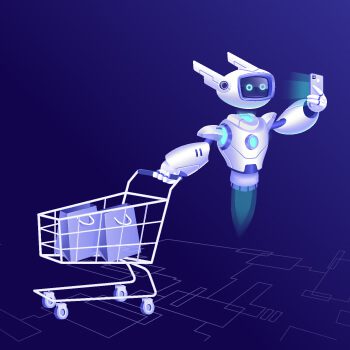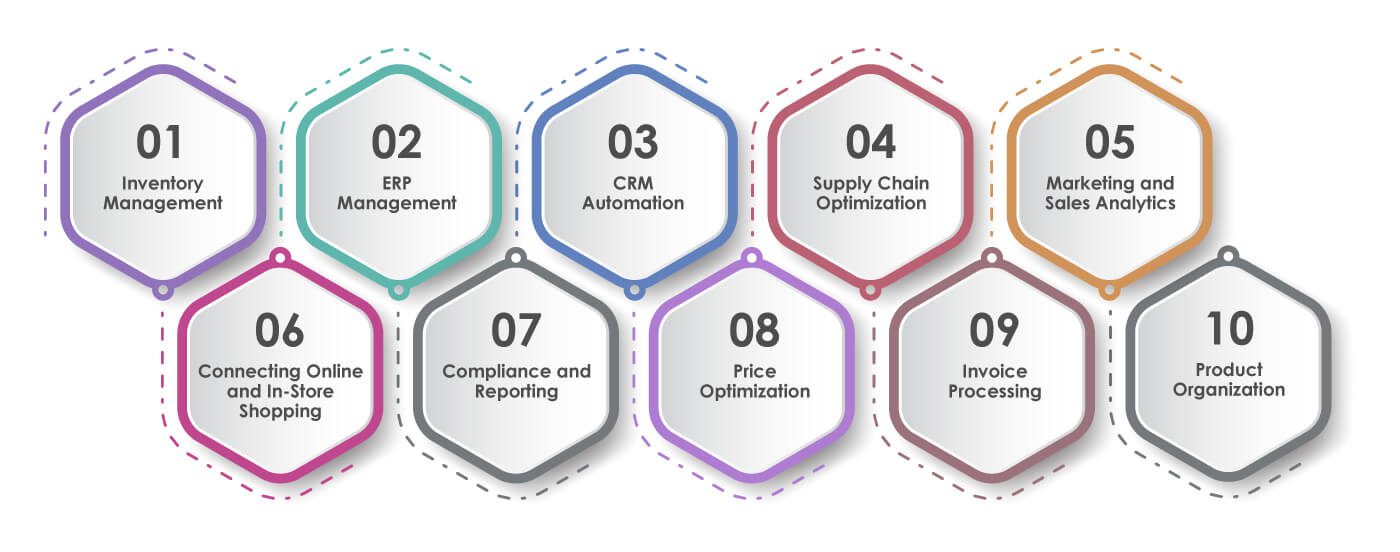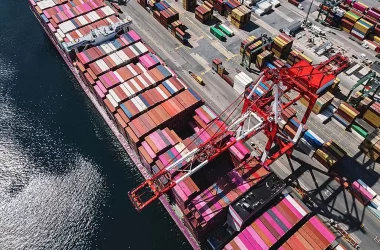- Overview of RPA in the Retail Sector
- Top RPA Use Cases in the Retail Industry
- How Can TestingXperts Help with RPA Testing for the Retail Industry?
- Conclusion
The rapid technological transformation in the retail industry is mostly due to the integration of robotic process automation (RPA). Effective, streamlined and cost-effective operational processes have become the need of the hour as the sector faces growing competitive pressures and evolving customer expectations. It also acquires retail solutions that can help improve these processes to better the entire consumer experience.
The RPA adoption is not limited to major projects that operate independently. It is a strategic enterprise-wide initiative in 64% of businesses, which clearly reflects its role in business transformation. The benefits of RPA implementation are great and diverse. It results in an average cost reduction of 30%, attributed to the efficient process that was established. As for efficiency, 85% of the companies achieved greater speed, accuracy and volume handling and reported increased productivity. These benefits are further enhanced by enhanced compliance and reporting because, in 50% of cases, RPA eliminates human mistakes.
Overview of RPA in the Retail Sector

Retail organizations are realizing that robotic process automation can drive innovation and maximize efficiency. This technology has the capabilities to automate mundane and repetitive duties, accelerating processes and minimizing the risk of human mistakes. By managing inventory, assisting customers, and processing information, robotic process automation enables retail employees to concentrate on more strategic, customer-focused duties.
Robotic process automation has the potential to greatly enhance how customers shop. For example, it can accelerate handling customer questions and purchases, guaranteeing quicker and more precise replies. Computerized systems are capable of monitoring customer preferences and purchasing behaviors, resulting in individualized suggestions and services.
By delegating routine and mundane tasks to robotic process automation, employees have the opportunity to dedicate their time and efforts to more engaging and fulfilling work. When workers can focus on meaningful activities rather than repetitive duties, job satisfaction tends to rise while employee turnover declines.
Automated systems can take on heavier workloads when demand is highest without needing to expand the staff. This adaptability is essential for retailers that typically deal with changes in customer demand depending on the time of year.
The system can work together with present retail administration frameworks, guaranteeing a smooth changeover and the least interruption to ongoing tasks.
Through utilizing robotic process automation paired with machine learning and artificial intelligence, retailers can conduct predictive analysis to forecast future demand more precisely. This helps with improved inventory planning and fulfilling customer requirements.
Top RPA Use Cases in the Retail Industry

The automation of processes through robotic technology is significantly impacting the retail sector. By robotically handling vital tasks, stores are able to streamline their procedures and improve customer service. This boosts effectiveness and earnings. The applications of robotic process automation vary widely and create major effects, such as overseeing stock levels or refining promotional tactics. Let us examine these leading RPA applications in further depth:
Inventory Management:
Inventory levels require vigilant monitoring to ensure availability without maintaining excessive stock. Through integration with inventory databases, robotic process automation streamlines this task. Automatically tracking stock and initiating reordering provides transparency into current levels and reduce human mistakes. These automated systems also forecast needs using sales patterns and seasonality. As a result, optimal quantities are continuously upheld. Such precision in overseeing inventory leads to decreased carrying charges and heightened product presence. Customers enjoy consistent access to goods while operations run smoothly and cost remain low—all thanks to the intricacies of robotic process automation.
ERP Management:
In ERP systems, RPA automates data entry, report generation, and routine administrative tasks, thus ensuring data accuracy and consistency. It streamlines various ERP components such as finance, HR, and supply chain, enhancing coordination and efficiency. RPA bots can extract data from various sources, process it, and feed it into the ERP system, facilitating real-time data processing and decision-making. This integration reduces manual labor and errors, leading to significant cost savings and improved operational efficiency.
CRM Automation:
RPA automates typical repetitive tasks done in CRM systems, which include activities such as regular customer information updates, establishing appointments, and supervising communications. It improves customer interaction by ensuring the response is delivered at the right time. For example, RPA can evaluate customer comments, classify them according to the groups, and channel/direct them to the appropriate department for action. This reduces response times and helps to understand customer needs, leading to decreased ease in customer retention and acquisition strategies.
Supply Chain Optimization:
Supply chain optimization through robotic process automation can streamline operations. By automating tasks like order processing, shipment tracking, and communication with suppliers, RPA brings efficiency. It helps synchronize supply chain data across different systems to ensure information is accurate and up-to-date. This leads to quicker turnaround, fewer mistakes, and stronger supplier ties. RPA also facilitates predictive analysis. Automating repetitive jobs aids demand forecasting, inventory control, and transport management. Overall, implementing RPA improves supply chain performance while reducing costs.
Marketing and Sales Analytics:
Automated tools analyze extensive marketing and sales data, offering valuable insights. They monitor campaign results, customer involvement numbers, and sales patterns, enabling retailers to modify their immediate strategies. This guides more aimed and robust marketing efforts, progressive customer classification, and boosted returns on marketing costs.
Connecting Online and In-Store Shopping:
RPA helps link online and in-store shopping smoothly. It guarantees consistent prices, deals, and product stock across all areas. By automating duties like inventory updates and order handling, RPA certain a unified customer experience regardless of how someone shops. This connection is essential for omnichannel retail, improving customer experience and workflow.
Compliance and Reporting:
Through automation, RPA ensures accuracy in regulatory reporting and adherence to compliance standards. It routinely monitors transactions and operations, comparing them against requirements and signaling any inconsistencies for examination. This ensures accuracy in providing information to regulatory bodies and following the rules, decreasing the chance of penalties due to noncompliance. It also conserves time and resources spent on compliance administration, allowing retailers to focus more on crucial business operations.
Price Optimization:
Robotic process automation can help analyze market information, competitor costs, and customer needs to assist with flexible pricing tactics. It allows retailers to modify prices instantly and maximize earnings. RPA-guided price optimization guarantees data-driven and reactive pricing judgments, lifting sales and customer fulfilment.
Invoice Processing:
By utilizing robotic process automation, the handling of invoices can be automated. Tasks like data input, validation, and reconciliation are reduced. This lessens the time and effort needed for invoices, decreases mistakes, and quickens payment. Automated invoice processing boosts the effectiveness of the accounts payable department. It results in improved cash flow management.
Product Organization:
RPA assists with grouping and arranging products within retail databases. This involves revising product details, classifying items according to multiple standards, and confirming that product listings are correct and current. Automating this process heightens the precision of stock records, enhances the customer shopping experience, and aids in effective stock administration.
Conclusion
To conclude, robotic process automation changes retail activities as it introduces massive efficiency and innovation. RPA application across several features of retail, from simplifying inventory and supply chain processes to boosting customer engagement and sales plans, demonstrates its key role in retail transformation. Retail organizations that utilize RPA are gaining greater operational efficiency, lower prices, and higher customer satisfaction. Ideally, the process of integrating RPA will result in more intelligent and efficient retail business practices that are indispensable for the success of the retail business industry.
How Can TestingXperts Help with RPA Testing for the Retail Industry?

It is crucial to guarantee that robotic process automation solutions function seamlessly to fully realize their benefits. TestingXperts, with its structured RPA testing methodology comprising both functional and non-functional elements, makes certain that the RPA bots perform adeptly. This aligns precisely with retail business objectives.
Key Differentiators:
• Our tools allow for faster test creation and implementation, substantially decreasing the time required to introduce robotic process automation solutions to the marketplace. This efficiency is crucial for retailers hoping to adapt by incorporating RPA technologies as they seek to optimize operations.
• Through streamlining our testing methods, we can reduce the necessary maintenance steps by up to 30% of work. This efficiency makes the adoption of robotic process automation realistically affordable for retailers.
• We provide comprehensive evaluation of robotic process automation workflows and agents. We verify every component of your RPA deployment to ensure proper functionality and dependability within your automated systems. This allows us to certify full coverage and stability in your automation procedures.
• Our services can help organizations maximize effectiveness and output with reduced manual labor requirements. This permits streamlined processes and frees personnel to concentrate on more essential tasks.
• Our experienced team has undergone official certification in robotic process automation testing, guaranteeing comprehensive and productive evaluation of your RPA implementations.
To know more, contact our RPA testing experts now.
The post Top 10 RPA Use Cases in Retail Industry Transformation first appeared on TestingXperts.





